The Google Nexus 9 Review
by Joshua Ho & Ryan Smith on February 4, 2015 8:00 AM EST- Posted in
- Tablets
- HTC
- Project Denver
- Android
- Mobile
- NVIDIA
- Nexus 9
- Lollipop
- Android 5.0
GPU Performance
While Denver is new, the Kepler GPU in the Tegra K1 is mostly a known quantity by now. In the Nexus 9, the GPU is still a single SMX clocked to 852 MHz. In order to verify performance, we turn to our standard test suite. For the most part, our GPU-bound tests are meant to represent gaming performance although tests like 3DMark can have CPU-bound aspects while GFXBench tends towards being a pure GPU test.
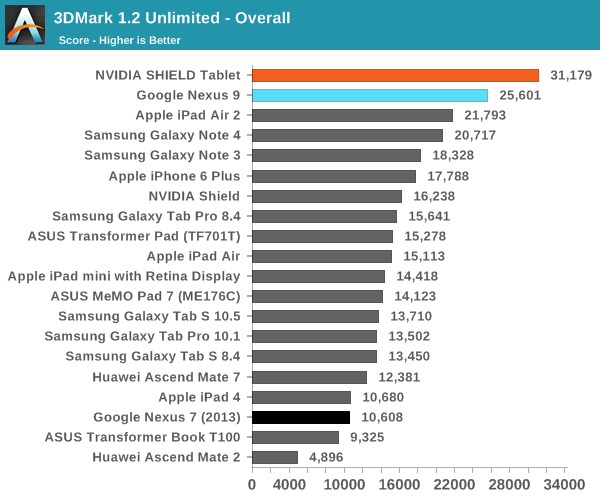
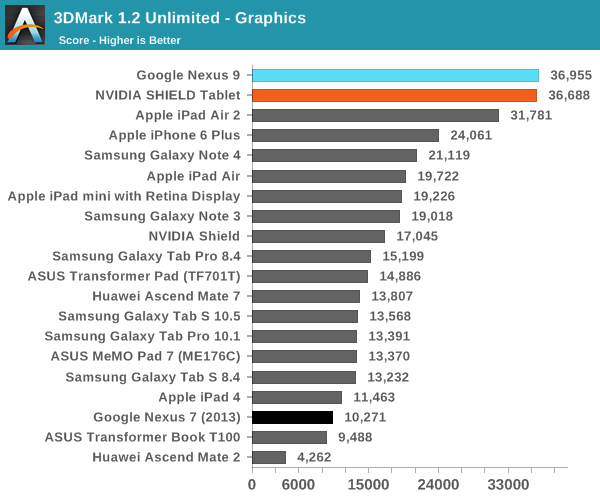
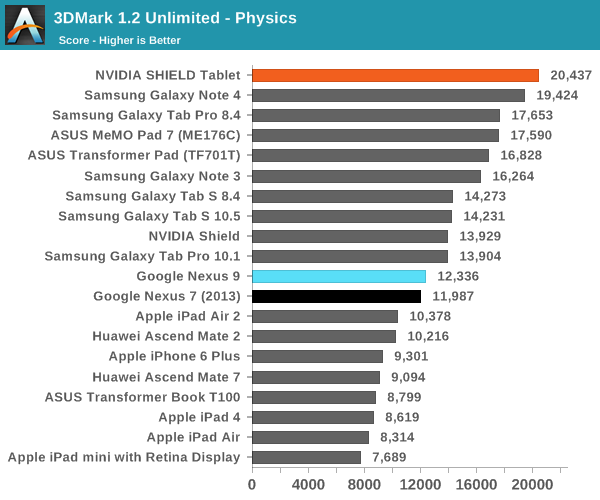
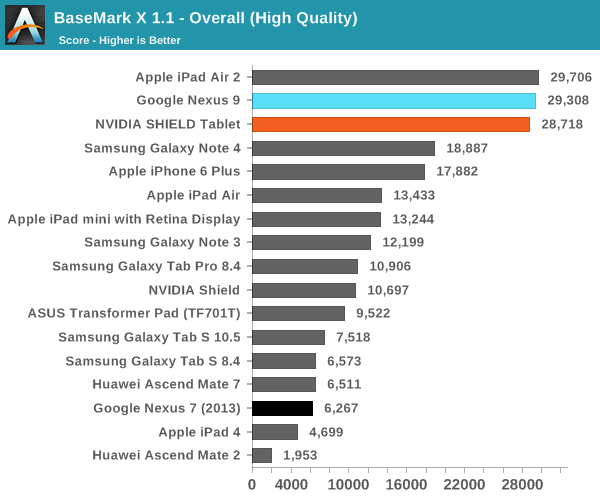
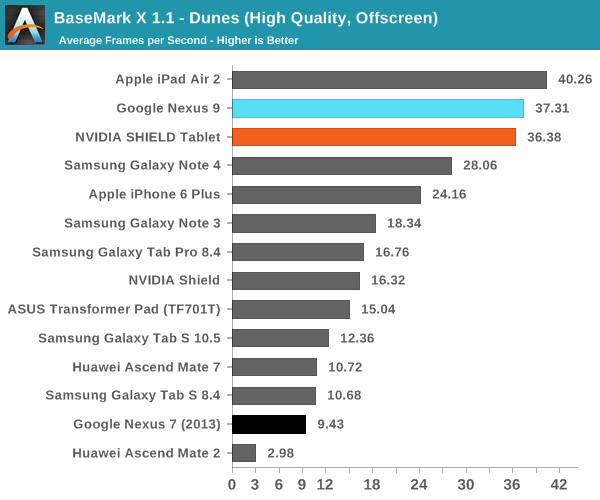
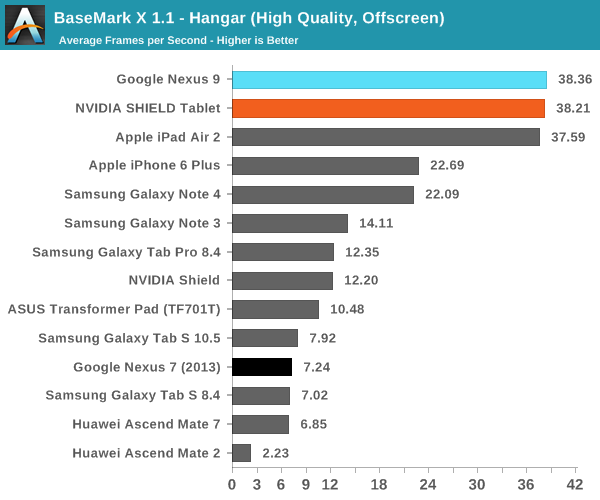
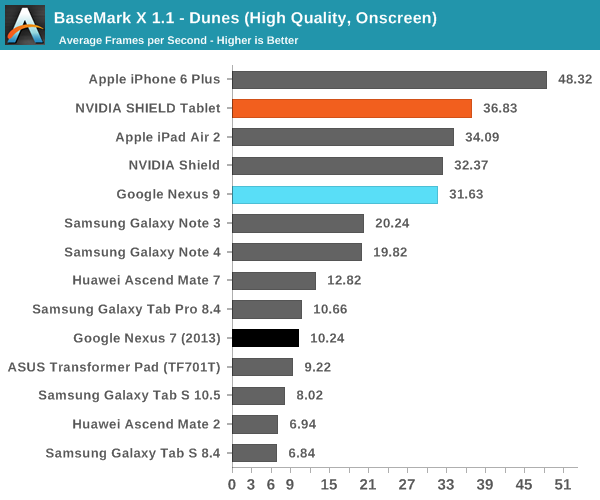
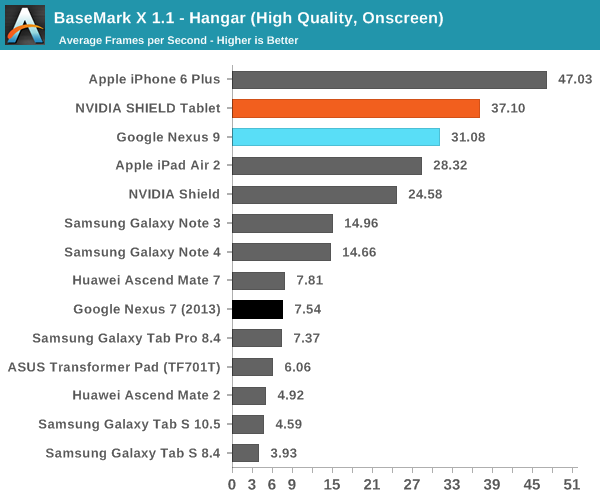
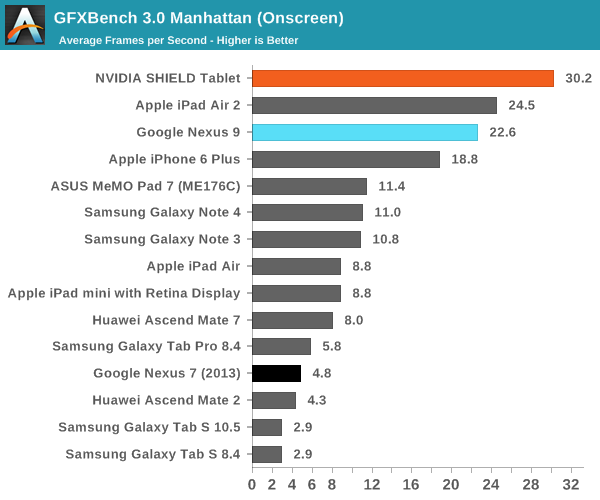
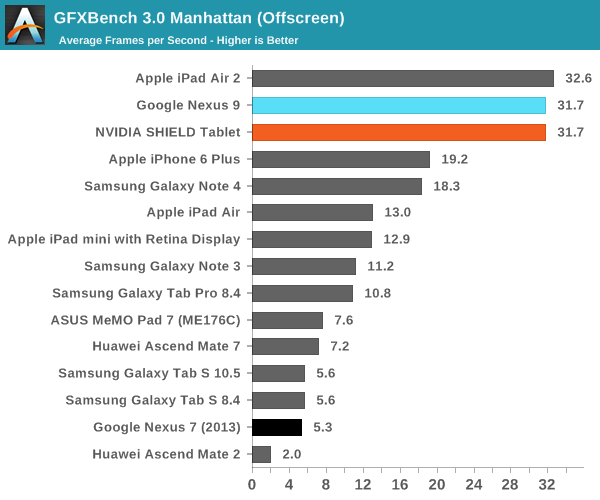
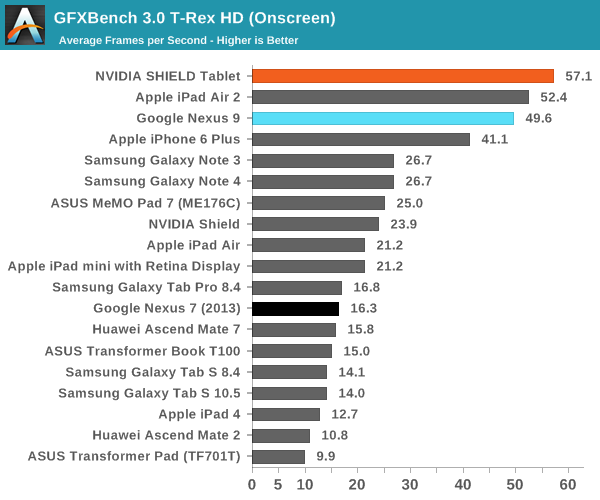
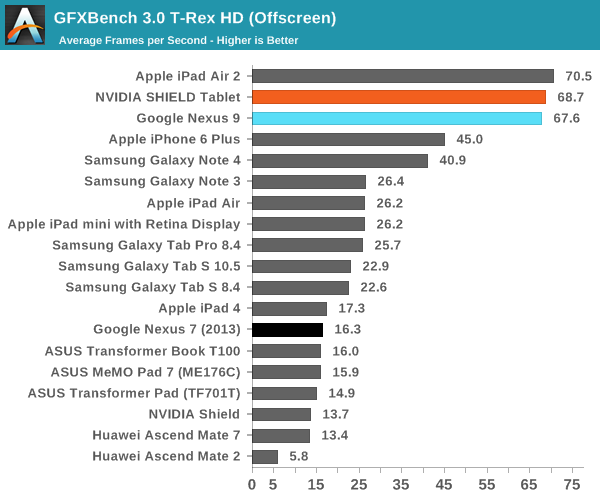
The Nexus 9's GPU has effectively identical performance to what we saw in the SHIELD Tablet, which means that the Nexus 9 should be able to support a broad range of games without performance issues. There is a bit of a noticeable performance delta when comparing on-screen performance, but this is simply due to the higher resolution of the Nexus 9's display. The one notable exception is the 3DMark physics test, which seems to scale with core count quite well, and that causes Denver to fall slightly short of the quad A15 configuration.
NAND Performance
While storage performance can often be secondary to a smooth user experience, poor storage performance is extremely painful. This is similar to RAM, where the difference between 2 and 3 GB is generally academic, while the difference between 512MB and 1 GB is enormous. While there have been some issues with Androbench with the move to Android 5.0, it seems that the timer issues have since been resolved, so it's possible to resume using the results from Androbench to get a rough idea of NAND performance.
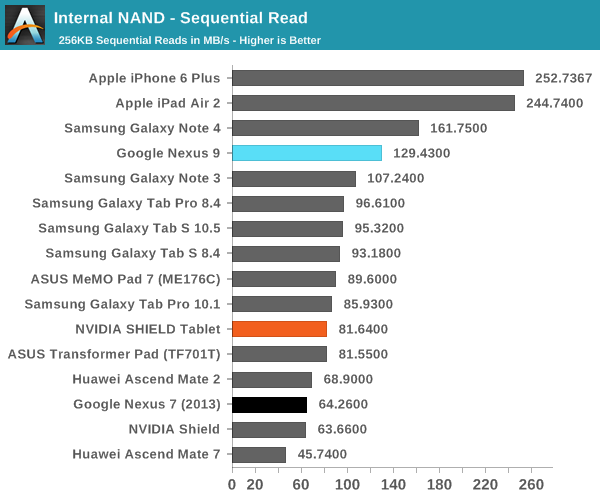
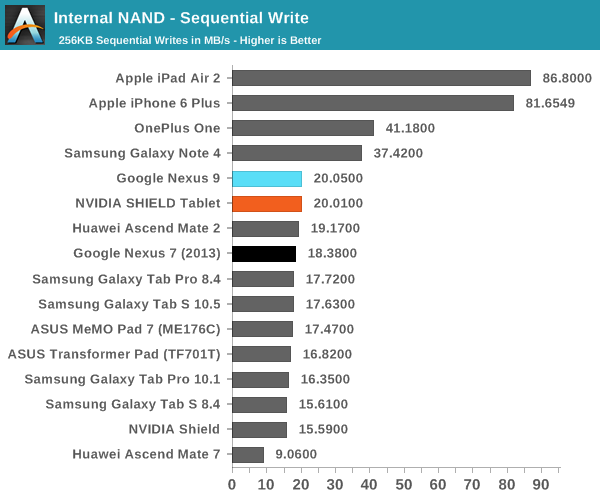
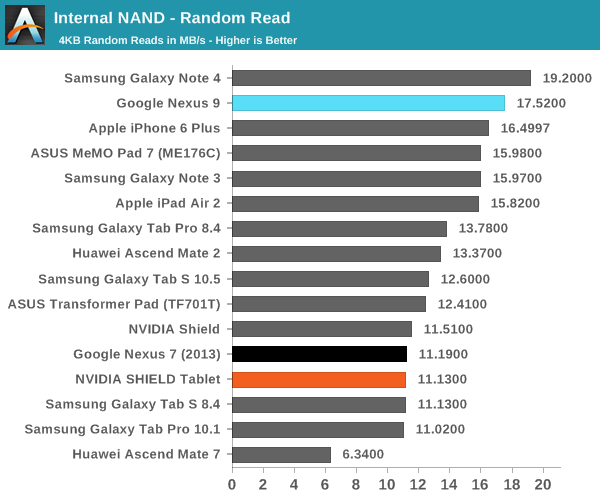
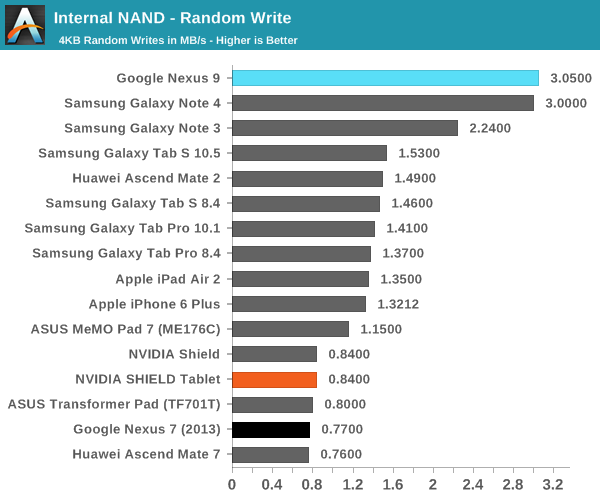
Here the Nexus 9 doesn't suffer nearly as much from full disk encryption that is forcibly enabled on the device; performance is noticeably higher than what we see in the Nexus 6. This seems to lend some credence to the theory that CPUs with ARM v8 ISA would be better suited to handling the need to encrypt and decrypt storage in real time. I tested the Nexus 9 with a custom kernel without full disk encryption to see how Androbench scores might change, but this didn't have a noticeable impact which seems to back this theory, although I'm still not confident that FDE is a good idea to enforce across all new devices.
The NAND itself, a Samsung eMMC package designated by the name BWBC3R, seems to be quite performant outside of pure sequential access, which seems to suggest that HTC hasn't skimped out in this area at all, and the use of F2FS is responsible for some of the best random I/O scores in any mobile devices we've tested thus far.










169 Comments
View All Comments
mkygod - Saturday, February 7, 2015 - link
I think so to. The 3:2 ratio is one of the things that Microsoft has gotten right with their Surface Pro devices. It's the perfect compromise IMOUtilityMax - Sunday, February 8, 2015 - link
I am a little perplexed by this comment. A typical user will be on the web 90% of time. Not only the web browser does not need to be natively designed or optimized for any screen ratio, but it also will be more usable on a 4:3 screen. So will the productivity apps. The only disappointment for me on the 4:3 screen would be with watching the widescreen videos or TV shows. Moreover, there is quite a bit of evidence than a lot of the next generation tablets will be 4:3. Samsung's next flagship tablet supposedly will be 4:3.gtrenchev - Wednesday, February 4, 2015 - link
Anandtech is becoming more and more boring last year. Sparse on reviews, short on tech comments, lacking on depth and enthusiasm. I can see Anandtech has become a just job for you guys, not the passion it was for Anand :-) And yes, his absence is definitely noticeable.George
Ian Cutress - Wednesday, February 4, 2015 - link
Was the Denver deep-dive not sufficient enough? Always welcome for comments.As for timing, see Ryan's comment above.
We've actually had a very good quarter content wise, with a full review on the front page at least four out of every five weekdays if not every weekday.
milkod2001 - Wednesday, February 4, 2015 - link
Why not to post on your forum some sort of suggestion box/poll where all could say what should get reviewed first so some folks won't cry where is the review of their favorite toy :) ?Impulses - Wednesday, February 4, 2015 - link
Because they'll still cry regardless, and they can't possibly work entirely based on readers' whim, doesn't make sense logistically or nor editorially... Readers might vote on five things ahead of the rest which all fall on the same writer's lap, they won't all get reviewed before the rest, or readers might not be privy to new hardware because of NDAs or cases where Anandtech can't source something for review.tuxRoller - Thursday, February 5, 2015 - link
While I enjoyed the review, I would've loved to have seen the kind of code driven analysis that was done with Swift.In particular, how long does it take for dco to kick in. What is the IPC for code that NEVER gets optimized, and conversely, what is the IPC for embarrassingly instruction-wise parallel code? Since it's relying on ram to store the uops, how long does the code need to run before it breaks even with the arm decoder? Etc.
victorson - Wednesday, February 4, 2015 - link
Are you guys kidding? Better late than never, but heck.. this is freaking late.abufrejoval - Wednesday, February 4, 2015 - link
Thanks for making it worth the wait!The in-depth analysis of Denver is uniquely Anandtech, because you can't get that anywhere else.
And while Charly D. is very entertaining, the paywall is a bit of an impediment and I quite like again the Anand touch of trying to be as fair as possible.
I was and remain a bit worried that there seems to be no other platform for Denver, which typically signals a deeper flaw with an SoC in the tablet and phone space.
While I'm somewhat less worried now, that Denver might be acceptable as a SoC, the current Nexus generation is no longer attractive at these prices, even less with the way the €/$ is evolving.
Taneli - Wednesday, February 4, 2015 - link
eDRAM cache à la Crystalwell would be interesting in a future Denver chip.